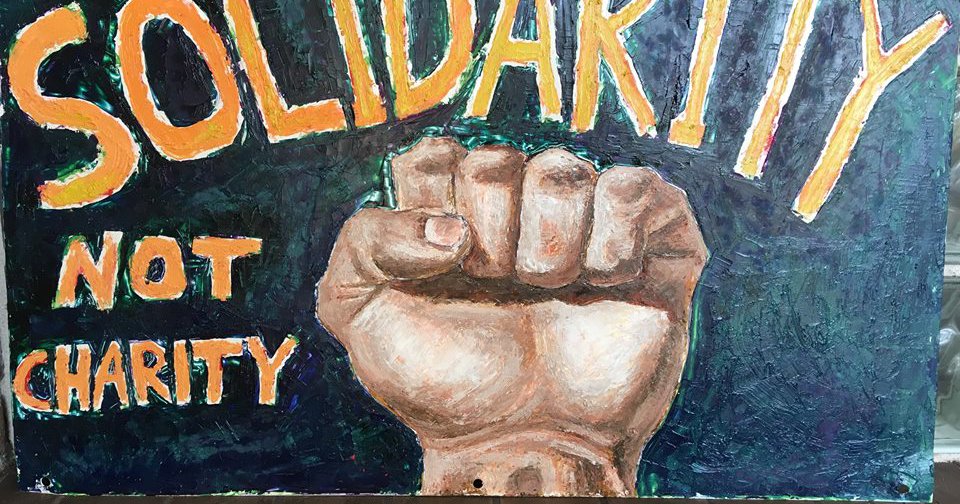Breaking away from narcissism: emotions and grassroots activism in the time of COVID-19 - 4 minutes read
 If we are paying attention to the emotional dimension, we can see how narcissism, egoism and cynicism are at the heart of this response. But, furthermore, we have seen other emotional strategies, including demonising the fear of the disease and devaluing caring and worrying about others, for example, the Brazilian president’s accusations of cowardice against those who stay at home and request measures to avoid the virus spreading.
If we are paying attention to the emotional dimension, we can see how narcissism, egoism and cynicism are at the heart of this response. But, furthermore, we have seen other emotional strategies, including demonising the fear of the disease and devaluing caring and worrying about others, for example, the Brazilian president’s accusations of cowardice against those who stay at home and request measures to avoid the virus spreading.Neoliberal emotional culture is so deeply rooted that many people have been more afraid and anxious about losing privileges, that until now they believed to be untouchable or at least safe, than about losing their lives or their loved ones. This is also influenced by what psychologists call the “myth of invulnerability”, in other words: it will affect all the others but not me.
Perverse new narratives
Since denial has become a politically incorrect narrative in many countries where the number of infected people and deaths has increased, other feeling rules have been revealed that we could say are even more perverse.
For instance, there is a new narrative, which we can observe in different countries, that channel anger and blame towards other individuals. This narrative is needed in order not to admit that the neoliberal system has made us more vulnerable, because that may generate a moral shock among those who feel they are supported by it, inevitably leading to blame being placed at the door of those who feed and promote this system.
There are many examples of this: from blaming the people who brought the virus because they travelled (which in Mexico’s case is fed by resentment towards the middle and upper classes generated by social inequality), to blaming those who do not follow ‘social distancing’ or self-isolation rules.
This is joined by hatred towards communities that are considered by some people as inferior and therefore culpable for this pandemic; belittling the most vulnerable who force those who are not vulnerable to cease their productive activities; admiration for those who are most able to benefit from this situation, etc.
These rules have caused and made legitimate: violent attacks on Asian communities; social control and denunciations carried out by neighbours to report people breaking quarantine in Europe; attacks by communities on buses transporting residents from old people’s homes so that they cannot enter their areas; roadblocks set up by area residents who don’t want ‘outsiders’ in their communities; demands for and acceptance of authoritarian measures implemented by different governments, which will very probably take advantage of this crisis to clamp down on individual and collective freedoms.
Why grassroots activism is important
In this Orwellian landscape of authoritarianism, individualism and despair, social movements continue to play a fundamental role in building social alternatives, since “as collective mobilization grows, also the hope for change ensues – for another world that is still possible and all the more needed”.
On the one hand, we can observe how social movements at national and transnational levels have cancelled and suspended their public actions and have quickly adapted to the new social circumstances we are living in.
One example is the organisation of webinars, conferences, teach-in, assemblies and other online initiatives, as well as digital protests. These activities, from an emotional point of view, allow participants to connect with other people from all around the world and feel united and stronger, instead of alone and powerless. On the other hand, at local level, many grassroots groups are organising themselves to deal with the social costs of this pandemic and cope with the needs that the most underprivileged communities are experiencing. We are not talking about associations of social workers, NGOs or other bodies funded by using public and/or private funds to resolve the needs created by the system by way of support from the system itself.
The grassroots activism we are talking about is the one promoted by autonomous, self-organised groups that carry out direct action not only at protest events but also in everyday practices. In this case, direct action is aimed at producing improvements in the human condition within a certain oppressed community and is able to develop self-organisation methods to weaken the links of dependence and blackmail relationships existing between the state and communities, such as, for example, illegal immigrant communities, homeless people, nomadic communities, prisoners and the many different marginalised communities in cities.
Source: Opendemocracy.net
Powered by NewsAPI.org